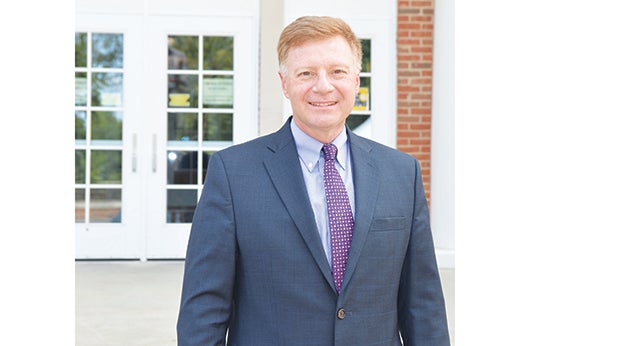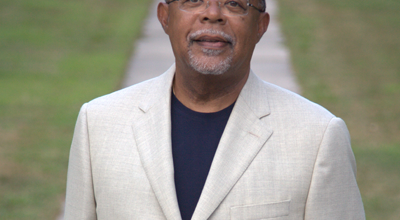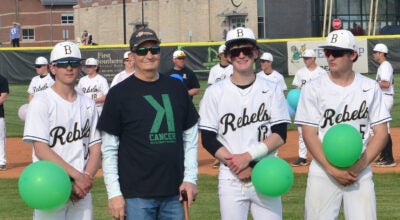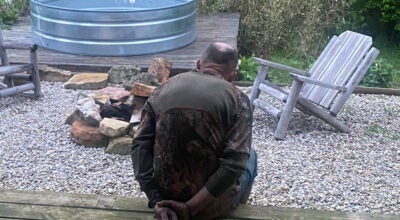Centre College’s new president begins role amid pandemic
Published 3:29 pm Thursday, September 10, 2020

- Milton Moreland is Centre College’s new president. He is the college’s 21st president and was previously provost and vice president of academic affairs at Rhodes College in Memphis, Tennessee. (Olivia Mohr photo)
BY OLIVIA MOHR
Milton Moreland, Centre College’s new president and the 21st president of the private liberal arts college, said although no president of a college or university thinks they’re going to be thinking so much about testing, monitoring, masks and cleaning products, it comes with the territory during a pandemic.
Moreland started his term as president at Centre on July 1 and was previously provost and vice president of academic affairs at Rhodes College in Memphis, Tennessee. He has been involved in higher education for 27 years and started his career in California. He has a background in ancient history, ancient religions and archaeology and later became interested in administration. He said the academic world during the COVID-19 is strange, but he’s excited to tackle new challenges.
“It’s been interesting,” he said. “It’s been a little weird, but it’s also, I think, brought us together as a team in ways that are so quick and intense but good — good to see people step up, take on new roles, take on new jobs and stretch all of us in ways we really never expected to be stretched.”
The key to all this stretching, he said, is flexibility. He said students and faculty have the option to do classes remotely, in person or a mix of both. Also, he said thousands of hours go into planning, policy writing and working with students and faculty to figure out how best to move goals forward.
For example, some of the college’s larger indoor spaces have been converted into spaces with socially-distanced tables where students can eat, study and socialize. Outdoors, about 12 large tents have been set up where there are outdoor classes held — faculty can choose when and whether to have classes outdoors, and some have all their classes outdoors — and where students can gather.
At the beginning of each week, about half of the students, faculty and staff on campus are tested for COVID-19. Currently, there are about 1,100 students on campus and 230 off campus. The testing happens outside under tents and is done semi-randomly so that each person on campus is tested at least once every two weeks and is done to ensure that people from different housing and areas of campus are tested regularly. An online dashboard tracks how many tests have been conducted since Aug. 1, how many positive tests there are and how many people are quarantined or isolated. The cumulative positivity rate as of Sept. 10 was 0.45%, according to the dashboard.
Before they came to campus, students signed a social contract that continues to adapt. They also were tested before they began the semester and before they moved onto campus. There is a reporting system in place for any concerns students have about adherence to guidelines. Any students who test positive are isolated, and contact tracing is set in place to quarantine students who may have been exposed to students who have contracted COVID-19. Moreland also said if the campus becomes unsafe, the college will transition to online learning exclusively, something he said colleges and universities nationwide are keeping in mind.
Michael Strysick, chief communications officer at Centre College, applauded Moreland’s performance as president so far in preparing the campus for adjusting to the pandemic.
“In fact, I think Rhodes was maybe a week or two ahead of us in terms of its planning, so we really benefited from the insights that he brought to the leadership role here, and it’s been really evident in the success that we’ve had so far,” Strysick said.
Moreland said social activities on campus have had to adjust, but students are still involved in organizations, which he’s glad to see. Things are happening over Zoom or in socially-distanced spaces. Speakers are still coming to the college, but there is mostly a community of online learners through Zoom. Classes are being held in a block schedule that keeps students busy, but students are able to take every class the college offers this semester. Another change is the dining situation. Students can pick up their food to go in the dining hall and can eat in socially-distanced areas, in their dorm rooms or outside. The dining hall is not currently open to the public. Also, Norton Center for the Arts is not currently hosting concerts and plays.
“It’s a challenge to have that full student-participatory, residential college model that we’re famous for,” Moreland said.
Moreland remains excited moving forward by the projects on campus.
“I think in some ways, of course, when you come into a setting and it’s experiencing a pandemic, you’re kind of in survival mode,” Moreland said. “But at the same time, as you look across campus, you see these beautiful projects coming to completion.”
Projects include construction of the Olin Hall science complex and the renovation of the library to have a learning commons on the main floor.
Another project is CentreWorks, which will be located on the third floor above The Hub coffee shop and the Centre bookstore on Main Street. Initiatives for CentreWorks, which aims to bring the campus and Danville communities together to work on entrepreneurial projects and establish opportunities for growth, have already begun, and there was a virtual bootcamp with the theme of resilience for first-year students at the beginning of the semester to teach them about how to make entrepreneurial efforts during and after a pandemic.
Moreland not only has plans set in place for the college but also for himself looking forward.
“I think that everybody right now is hopefully thinking of their own sense of wellness and health, and it’s a time that’s very challenging,” he said. “So for me, I’ve enjoyed having the goals of getting to learn new city, new friendships, new people, new partnerships, and I’ve even taken up jogging.”






